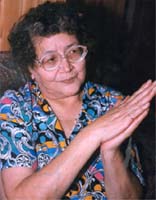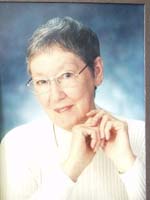Rita Joe
Categories: Female Authors - Anglophone Authors - Poets - Novelists - First Nation Authors - Southeast

Source: Daniel N. Paul
Biography
The Honourable Rita Joe (née Rita Bernard), poet (born at Whycocomagh, Nova Scotia, on 15 March 1932; died at Sydney, Nova Scotia, on 20 March 2007) was born and spent her childhood on a Mi'kmaq Reserve at Whycocomagh on Cape Breton Island. She lived with foster families after her mother's death when she was just 5 years old. Orphaned when she was 10, Rita Joe left the island at the age of 12 to go to the Shubenacadie Indian Residential School on mainland Nova Scotia. Rita Joe later returned to Cape Breton to live on the Eskasoni First Nation, where she and her husband raised 10 children.
Rita Joe's first collection of poetry, titled The Poems of Rita Joe, was published in 1978. Song of Eskasoni: More Poems of Rita Joe appeared in 1989, followed by Lnu and Indians We're Called in 1991. Rita Joe's poetry is included in the 1994 anthology Kelusultiek: Original Women's Voices of Atlantic Canada. Poems from Rita Joe's first collection can also be found in We Are the Dreamers: Recent and Early Poetry (1999). Rita Joe co-edited, with Lesley Choyce, and contributed to The Mi'kmaq Anthology (2003). Rita Joe is the subject of a 1993 National Film Board documentary titled Song of Eskasoni. Her memoir, Song of Rita Joe: Autobiography of a Mi'kmaq Poet, was published in 1996.
How has New Brunswick influenced your work?
"I am," she says, "a daughter or grandmother to everyone in Eskasoni. Who can ask for more? I want to be an exceptional writer, a memory I want to leave behind, an orphan child, picking herself off the misery of being a nobody, moving little grains of sand about the nation of the land.... Representing my people gives me a good feeling, a natural high, just reading from the book or singing an Indian song with a drum. I wish more of my people would write the beautiful stories I hear them tell. The Micmac are good storytellers. That bridge I have crossed, the insecurity of being a minority is no more. There [have been] many helping [me] across, but it takes one to be brave on one's own to cross that bridge...."
Joe, Rita. (1993). "Interview with Gordon E. Smith." August.
|
Literary Prizes |
|
|---|---|
| Honorary Doctorate of Letters, Mount Saint Vincent University - 1998 | |
| Honorary Doctorate of Letters, University College of Cape Breton - 1997 | |
| National Aboriginal Achievement Award - 1997 | |
| Honorary Doctorate of Laws, Dalhousie University - 1993 | |
| Queen’s Privy Council for Canada - 1992 | |
| Order of Canada - 1990 | |
| Atlantic Writing Competition - 1974 |
|
Featured Publication |
||||
|---|---|---|---|---|
|
Lnu and Indians We’re Called (1991) |
Excerpt: Keskmsi’ At age seven I go to school The teacher is talking I do not understand much of what he says So my stubby pencil makes contact With a scrap of paper I print small words, The ones I know, I try to put them in order. “Bring that paper here,” the teacher yells. Timidly I walk, my knees trembling I hand him the paper. His eyes widen, “Where did you find these?” I point at myself, my head, my heart, The fear lessening. He reads my first poem, A jumble of words Kes-km-si’ na I’ve caught up with myself, That is why I am here Poetry is my tool, I create as I go Kes-km-si’ na, I tell you now. Maybe tomorrow I will leave you, Remember my stubby pencil, And you too may “do.” Na kes-km-sit-isk naki’l elt. You too will be ahead of yourself. |
|||
Find this author in the New Brunswick public libraries catalogue.
Source(s):

